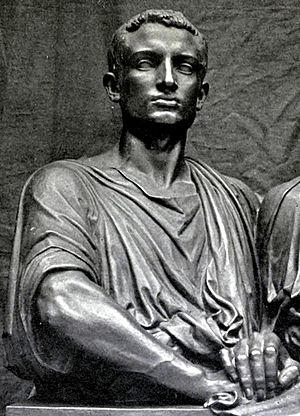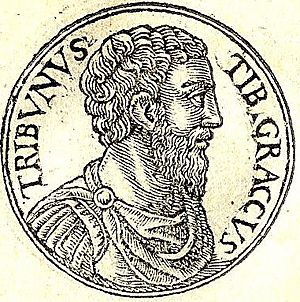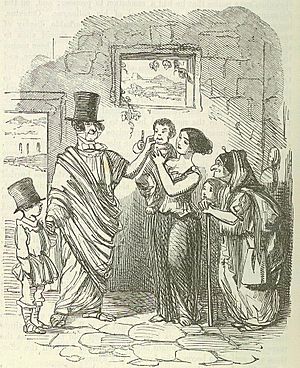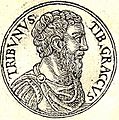Tiberius Gracchus facts for kids
Quick facts for kids
Tiberius Sempronius Gracchus
|
|
|---|---|

A statue of Tiberius from the 1800s. It shows him with his brother, the Gracchi.
|
|
| Born | c. 163 BC |
| Died | 133 BC (aged probably 29) |
| Known for | Land reforms |
| Office | Tribune of the plebs (133 BC) |
| Children | 3 sons (died young) |
| Parent(s) | Tiberius Sempronius Gracchus and Cornelia |
| Relatives | Gaius Gracchus (brother) Sempronia (sister) Scipio Nasica Serapio (cousin) Scipio Africanus (grandfather) |
| Military career | |
| Rank | Military tribune and quaestor |
| Wars |
|
Tiberius Sempronius Gracchus (around 163 BC – 133 BC) was a Roman politician. He is famous for his law about land. This law aimed to give land from the Roman state and rich landowners to poorer citizens. He also served in the Roman army. He fought in the Third Punic War and in Spain.
Many people in the Roman Senate were against his land reform bill. But it passed when he was a tribune of the plebs in 133 BC. People worried about Tiberius's popularity. They also worried he was breaking political rules. This happened when he tried to be tribune for a second time in a row. His enemies caused a riot, and Tiberius was killed. Many of his supporters also died. About ten years later, his younger brother Gaius suggested similar laws. He also met a similar end.
Tiberius's death is often seen as the start of the Roman Republic's decline.
Contents
Early Life and Family
Tiberius Sempronius Gracchus was born in 163 or 162 BC. He was about 29 years old when he died. From birth, he was part of Rome's noble families. These families were called the Nobiles.
His father, also named Tiberius Sempronius Gracchus, was from a leading Roman family. He was a consul twice and a censor. He also won two triumphs, which were big celebrations for military victories. His mother, Cornelia, was the daughter of the famous general Scipio Africanus. Scipio Africanus was a hero of the Second Punic War. Tiberius's sister, Sempronia, married another important general, Scipio Aemilianus. Tiberius grew up with his mother, sister, and brother Gaius Gracchus.
Tiberius Gracchus married Claudia. She was the daughter of Appius Claudius Pulcher. Appius was a consul in 143 BC. The exact date of their marriage is not known. It might have been a way to bring two important families together. This marriage made the friendship between Tiberius's father and Appius stronger for their children's generation.
Military Service
Tiberius started his military career in 147 BC. He served as a military leader under his brother-in-law, Scipio Aemilianus. This was during the Third Punic War against Carthage. Tiberius was among the first to climb Carthage's walls. He served until the war ended the next year.
In 137 BC, he became a quaestor. A quaestor was a Roman official who handled money. He served under Consul Gaius Hostilius Mancinus in Spain. This was part of the Numantine War. The Roman army was not doing well. Mancinus and his army lost several battles. They were surrounded by the enemy. Tiberius was sent to negotiate a peace treaty.
Tiberius's talks were successful. This was partly because his father had good connections in Spain. The Numantines had captured Roman books. Tiberius asked for his quaestor account books back, and they agreed.
However, the Roman Senate rejected the treaty. They thought the terms were too shameful. They wanted to punish Mancinus. Tiberius quickly changed his mind about the treaty. He distanced himself from it. He was probably chosen to be an augur around this time. An augur was a religious official who interpreted signs.
Tribune of the People
Tiberius Gracchus was elected as a plebeian tribune for 133 BC. Tribunes were officials who protected the rights of common people. At this time, Rome's political system usually found solutions through talks.
Many poor people wanted land to be given out again. Gracchus had huge support from the people for this idea. He was not willing to back down or make deals. This broke with normal political behavior. Earlier, a similar land reform idea was dropped because of strong opposition.
Tiberius and his father-in-law, Appius Claudius Pulcher, had many reasons for their actions. They wanted to help the state get more soldiers. They also wanted to help people have more children. Some also thought that giving land to soldiers returning from war would make them happy.
Rome's Land Problems
In the 130s BC, Rome faced several economic problems. There were not many jobs for workers. Food prices were high because of a slave rebellion in Sicily. More people meant more mouths to feed. Also, fewer people wanted to serve in the army for long periods. This led more people to move to cities.
These problems made it hard for people in cities to support themselves. It also affected poor people in the countryside. There were not many new settlements being built. Large farms used more wage labor. This meant it was hard for poor people in the countryside to find steady work.
The Roman state owned a lot of public land, called ager publicus. This land was taken during wars. The state did not use this land much. It was often used by Rome's allies.
Many small farms were becoming too small to feed a family. This was because Roman law divided land among all children. Farmers often sold their small plots to richer people. Land prices near Rome were very high. These farmers then worked as laborers. Many large farms needed temporary workers, especially during harvest time.
People could also move to cities to find jobs. These included public works or selling food. But after 140 BC, public building projects slowed down. Another option was the army. But by the late 130s BC, army life was hard. There was little chance for profit in wars in Spain. Many reports from that time talk about soldiers leaving the army.
Some people at the time believed that the countryside was losing people. They thought there was a shortage of men for the army. This seemed true to Gracchus and other Roman leaders. Even if the population was actually growing, it looked like there was a problem.
The Land Law (Lex Agraria)
Older laws said that no one person could own more than about 120 hectares of public land. But this law was often ignored. Many rich people owned much more land than allowed.
Tiberius Gracchus and his supporters explained the problem. They said rich slave owners were pushing poor farmers off their land. This led to fewer jobs for free workers. People were having fewer children because they could not feed them. This caused living standards to drop and fewer soldiers to be available.
To fix this, Tiberius Gracchus's law would limit how much public land one person could hold. The extra land would then be given to poor Roman citizens. Helping the poor was not the only goal. Gracchus also wanted to reduce problems in the city. He planned to move poor people to the countryside. This would also give them enough land to qualify for army service. The law would also help increase the number of potential soldiers.
It made sense that his land policy focused on people who knew about farming. So, most of his support came from poor people in the countryside. Thousands of people came from the countryside to support Gracchus. He was not alone in his ideas. He had support from a consul, his father-in-law, and other senators.
The law also created a special group of three people. Tiberius Gracchus, his brother Gaius, and his father-in-law, Appius Claudius Pulcher, were on this group. Their job was to survey land and decide which illegally held land would be taken back.
Passing the Land Law
People who owned more than 120 hectares of land strongly opposed the law. They had invested in improving this land. Some said the land was part of their wives' dowries or held family tombs. Tiberius Gracchus's law would take this land directly. This was a new idea.
Tiberius first suggested paying people for the land. But this idea was dropped. His later plan was to let them keep up to 120 hectares.
The law was proposed to the Assembly of the People. Tiberius did not ask the Senate for approval first. The Senate tried to get another tribune, Marcus Octavius, to stop the law. Both sides agree that Octavius was removed from his position.
In one version of events, Octavius used his veto power to stop the law. Tiberius tried to make him change his mind. He even shut down the Roman treasury, stopping most government business. When the Assembly met to vote, Octavius still said no. The Assembly then voted to remove Octavius from office. After Octavius was removed, the Assembly passed the law.
This dispute was a big problem. Rome's laws were not written down. The system worked best when everyone cooperated. Both Tiberius and Octavius were tribunes. They both represented the people. Octavius ignored the people's wishes by keeping his veto. Tiberius then removed an elected tribune. This was also a new and unusual action.
Opposition and Death
After the law passed, the Senate gave very little money to the land commission. This made it hard for them to do their job. They needed money for surveyors and other costs. Strong opposition to Gracchus's law grew when he suggested using money from the king of Pergamum. This money would help pay for the land distribution. It is not clear what the money was for. Some say it was for tools for farmers. Others say it was to buy more land.
Using this money was a big break from Roman political rules. The Senate usually controlled money and foreign policy. Senators also feared Gracchus wanted to use the money for himself. This fear grew when he tried to be re-elected as tribune. He said he needed to be re-elected to protect his land law. His attempt to be re-elected might have been against Roman law. It certainly broke Roman traditions.
Tiberius's re-election attempt gave his enemies a reason to act. During the election, Tiberius and his group were attacked. The mob was led by his cousin, Publius Cornelius Scipio Nasica. Scipio Nasica was the chief priest. He first tried to get the consul to kill Gracchus. When the consul refused, Scipio Nasica shouted a call to action. He led a mob to the election area. He tried to carry out an old religious killing. He believed Gracchus was trying to take power and overthrow the Republic. Tiberius and his supporters were killed without fighting back. Their bodies were thrown into the Tiber River. This opposition was political. Gracchus's land reforms might have been okay. But his actions seemed to threaten to make the poor people his personal followers.
After His Death
Tiberius's land law was not canceled. It was probably too popular to be safely undone. His place on the land commission was filled. The commission continued its work for several years. We can see its progress from old boundary stones found today. These stones show the names of the commissioners. Many stones have the names of Gaius Gracchus, Appius Claudius Pulcher, and Publius Licinius Crassus. More citizens were registered in the next ten years. This suggests a lot of land was given out.
However, the land commission's work slowed down after 129 BC. The Senate listened to complaints from Rome's Italian allies. The allies said the commission was unfairly taking their land. Scipio Aemilianus spoke for the Italians. He convinced the state to move decisions about Italian land away from the commission. He said the commission was biased. The consuls were given the job, but they did nothing. This stopped the commission from getting new land to give out.
Even so, the commission gave out a lot of land in its most active years. The Gracchan boundary stones are found all over southern Italy. About 3,268 square kilometers of land were given out. This helped between 70,000 and 130,000 settlers. Shortly after this, Scipio died.
Some of Gracchus's supporters were put on trial. Special courts were set up by the Senate for this purpose.
His Legacy
Tiberius's brother, Gaius Sempronius Gracchus, continued his career. He also became a tribune. He suggested similar, strong laws. He was also killed, this time with the Senate's clear approval. Part of Gaius's land plans was to start Roman settlements outside Italy. This later became a common policy. He was likely the first to realize there was not enough land in Italy for everyone.
Tiberius's killing also caused a bigger split between Scipio Aemilianus and his relatives.
Political Impact
Tiberius's murder started a cycle of more violence among Rome's leaders. This violence was used to stop popular movements. Roman law usually allowed people sentenced to death to leave the city and live in exile.
The Senate's continued actions against Tiberius Gracchus's supporters made Roman politics more divided.
A New Era in Politics
Many people, both in ancient Rome and today, see Tiberius Gracchus's death in 133 BC as the start of a new time. In this new time, politics became very divided. Political violence also became more common.
An ancient Roman writer, Cicero, said that Tiberius Gracchus's death divided the Roman people into two groups. Modern experts also share similar views.
Impact on Italian Allies
Some accounts say Tiberius wanted to give land to Rome's Italian allies. But there is no clear sign that his reforms helped them. The land was most likely given only to Roman citizens. Italians did not get land. In fact, the Italian allies were the strongest opponents of the land reform.
After Rome took public lands in wars, many Italians continued to use them. This had gone on for 70 years. The Italians expected to keep this land. While rich landowners complained the most, the commission's work was sometimes done quickly and incorrectly. Also, the land given in exchange for taken land might have been of lower quality. This also caused anger.
The loyalty of the Italian allies during wars had not earned them anything. It did not ensure they could keep the land they thought was theirs. Rome's decision to enforce its old rights over public land was one reason for the Social War. This war was fought between Rome and many of its Italian allies. It took away an important way for Rome to keep its allies loyal.
The problems with Italians and land reform led to later ideas. These included giving Roman citizenship to Italian nobles who lost land.
Images for kids
See also
 In Spanish: Tiberio Sempronio Graco para niños
In Spanish: Tiberio Sempronio Graco para niños
- Gaius Gracchus, his brother
- Gracchi brothers
- Scipio–Paullus–Gracchus family tree
 | Aaron Henry |
 | T. R. M. Howard |
 | Jesse Jackson |






